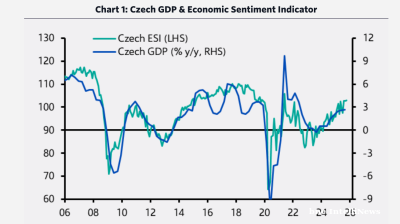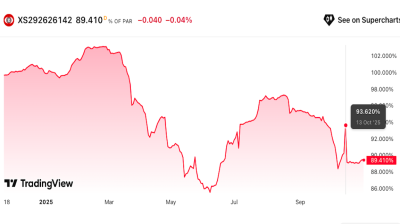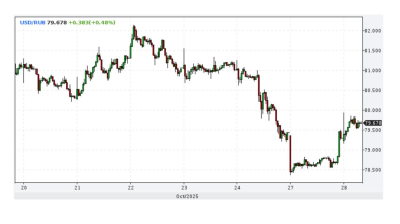The Monetary Council of the Hungarian National Bank equalised the interest rate on one-day quick deposits offered at daily tenders and the base rate to 13% on September 26 after reducing the former rate by 100bp for the fifth straight month.
The decision was in line with projections, and the EUR/HUF changed little after the monthly rate-setting meeting.
"By closing the gap rate, monetary policy will enter a new phase, which will provide an opportunity to develop a simpler set of instruments adapting to the changed environment," the MNB statement read.
The one-day quick deposits will be phased out of the monetary policy toolkit as of September 29 and the base rate will become the effective rate again. Hence, the MNB will return to practice before October 2022, when the MNB in an emergency session introduced O/N tenders to stem the freefall of the forint at 18%, 5pp above the base rate.
The MNB also revised its growth and inflation targets in its quarterly macroeconomic update. It cut its GDP forecast for the year from 0-1.5% to -0.5-0.5%, and the inflation forecast was revised from the 16.5-18.5% range in the last report in June to 17.6-18.1% for 2023.
Policymakers see inflation risks on the upside and GDP risks on the downside, MNB deputy governor Barnabas Virag said in an online presser. Inflation remains "unacceptably high", he said, adding that monetary policy conditions needed to "remain tight" to achieve price stability sustainably. At present there is a general and widespread trend in disinflation and year-end CPI could be in a range of 7-8%, he added.
Average annual inflation will fall to 4.0-6.0% in 2024, compared to the 3.5-5.5% forecast and to 2.5-3.5% in 2025, which was unchanged. The inflation path has shifted upwards "slightly" because of the carry-over effect of higher fuel prices, according to the MNB.
The report points to a "gradual increase" in Hungary's economic performance from Q3, after four consecutive quarterly contractions, the longest streak since 1995. The MNB revised its GDP forecast for 2024 from 3.5-4.5% to 3.0-4.0% and left its 2025 projections unchanged at 3.0-4.0%
Policymakers will make decisions based on the outlook for inflation and the developments in the risk environment while assessing incoming macroeconomic data and taking a "step-by-step, cautious approach", he pointed out.
Virag stressed that clear communication is "key" and noted the MNB's regular publication of analyses after the release of macroeconomic indicators such as GDP, inflation and current account.
Hungary’s central bank looks set to maintain a hawkish stance despite pressure by the government to carry out rate hikes at a faster pace as high borrowing costs constrain lending and economic growth. Economic Development Ministry Marton Nagy last week criticised the MNB for setting a target for offering the highest real interests to investors in the region. In his press briefing, Virag did not touch on that issue.
"The hawkish tone of the communications support our view that this next phase will begin with a pause in the cycle at the meeting in October," said Capital Economics in a note. "But with inflation likely to keep falling sharply we maintain our view for 500bp of interest rate cuts by Q1 next year."
In a separate statement, the MNB said that from October 1, the MNB will pay the base rate on both mandatory reserves – excluding the part on which no interest is paid – and optional reserves. The optional reserve ratio will be phased out from 2024. From September 27, the pricing of central bank discount bills as well as rates on long-term central bank variable-rate deposits will be aligned with the base rate. The MNB will maintain its presence in the swap market and continue to announce T/N swap tenders on workdays with an allotment of €6bn.
The EUR/HUF moved in a wide range on Tuesday. The hawkish comment by the MNB sent the currency pair to 387, but the dollar's strength erased these gains. The rise in US government bonds is bad news for emerging market currencies and the forint as well, which is one of the most vulnerable in the region.
Data

Russia’s manufacturing PMI falls to its lowest level since May 2022 in October
Russia’s manufacturing sector saw a deeper contraction in October, with output, new orders, and business confidence all weakening, according to the latest Purchasing Managers’ Index (PMI) data from S&P Global, published on November 1.

Czech growth accelerates as domestic demand-side pressure builds
The Czech economy delivered an unexpected acceleration in the third quarter, marking a clear shift from its earlier position as a regional underperformer to one of Central and Eastern Europe’s fastest-growing economies.

Eurobonds of Istanbul-listed Zorlu units offer attractive yields amid rating downgrades and no default expectation
Debut paper currently offering 14-15% yield.

Ruble strengthens as sanctioned oil companies repatriate cash
The Russian ruble strengthened after the Trump administration imposed oil sanctions on Russia’s leading oil companies, extending a rally that began after the Biden administration imposed oil sanctions on Russia in January.




